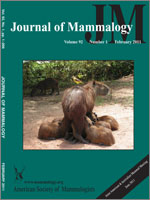Human suppression of fire has resulted in altered species composition and dense forest stands across the western United States. Accumulation of understory shrubs makes forests vulnerable to catastrophic fire and can impact animal use, whereas fire prescription can ameliorate negative impacts of suppression. We used radiotelemetry to determine patterns of habitat use and survival of Mexican fox squirrels (Sciurus nayaritensis chiricahuae) in fire-suppressed and fire-prescribed areas of the Chiricahua Mountains, Arizona. Core areas of squirrels within fire-suppressed areas were larger and contained more understory shrubs than core areas of squirrels in fire-prescribed areas. Shrub cover and canopy heterogeneity influenced core-area size and distance traveled, and squirrels that were depredated traveled farther than conspecifics that survived, but shrub cover and canopy heterogeneity were not directly associated with squirrel survival. Suppression-induced increases in understory vegetation might force squirrels to travel greater distances to meet energetic requirements and thereby increase predation risk. Retention of mature forested canyons and restoration of natural fire regimes will be important for the persistence of Mexican fox squirrels.
How to translate text using browser tools
16 February 2011
Impacts of fire suppression on space use by Mexican fox squirrels
Bret Pasch,
John L. Koprowski
ACCESS THE FULL ARTICLE

Journal of Mammalogy
Vol. 92 • No. 1
February 2011
Vol. 92 • No. 1
February 2011
Arizona
Fire suppression
Mexican fox squirrels
Sciurus nayaritensis chiricahuae
space use




